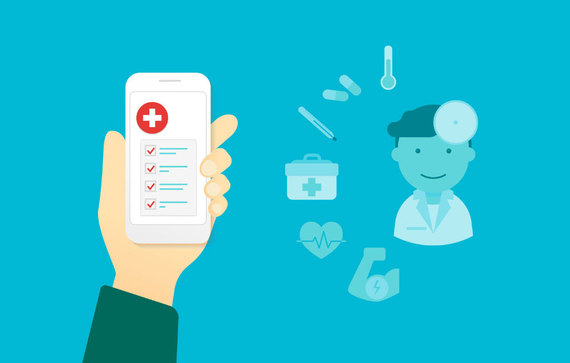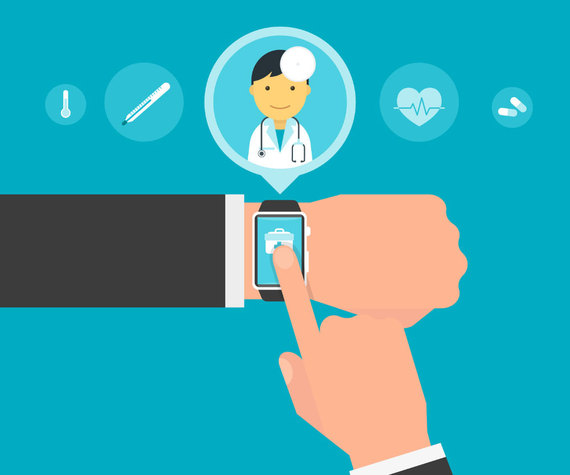Apple announced the open-platform medical research tool ResearchKit on April 15, and while it was overshadowed by news of the Apple Watch, it's a tool with staggering potential for humanity. "We are incredibly confident that [ResearchKit] will have a profound impact on all of us," Apple CEO Tim Cook said at WWDC in San Francisco. The initial apps released with ResearchKit included apps for asthma, Parkinson's disease, diabetes, cardiovascular disease, and breast cancer. So how does it work, and why is it important? Is it the future of healthcare research or just a flawed, creepy data collection tool? And what the heck does Google have to do with it?
A new method
With ResearchKit, anyone can participate in a scientific study. Researchers set the criteria and eligibility requirements in their app, and an interested iPhone user then downloads that app and fills out a questionnaire. The app then tells participants what to do. For the Parkinson's mPower app, for instance, users are asked to speak into their device's microphone and take several steps, allowing for researchers to track and measure gait to gauge the progression of the disease.
The robust technology of the iPhone and Apple Watch can give researchers never before imagined, real-world data. And the widespread use of the iPhone (and Apple Watch) means an exponential increase in the sample size available. Unlike traditional research, scientists won't be limited to slow, expensive, and laborious manual recruitment that yields relatively small sample groups. With ResearchKit and programs like it, any approved researcher can collect data on not dozens or hundreds but perhaps millions of people. This massive open access to research subjects and their data is what makes ResearchKit so important.
Just the beginning
But apps are just one aspect of ResearchKit's ultimate potential. Apple is now expanding into genome territory. Partnering with UCSF and Mount Sinai Hospital, they're currently recruiting large numbers of participants for a massive genome-sequencing project. So far we don't know exactly what Apple plans to do with all this information, but there's immense value in the interaction between your genetic data and your lifestyle data collected by things your phone and watch already track (location, purchasing habits, diet, fitness, and sleep). Combined, these two data could give researchers an unprecedented look at how genetics and environment interact to affect our health.
But it's not just Apple who wants in on the health game; Google is developing programs right alongside them. In 2014, Google launched the Baseline Study. The project aims to genetically and molecularly map healthy human bodies in a wide population, using the large amount of data identify and track genetic markers that could indicate a propensity for disease. Testing began with bodily fluid collections, and included a full genome study and family history. Future plans include the addition of wearables that could continually collect data and transmit it back to Google.
And now, Google has announced the launch of Study Kit, its answer to ResearchKit. With these two giants both working on health and genetic data collection, we could wind up with literally billions of gene sequences and health profiles from around the world.
Sampling bias? Maybe not.
The inherent problem for Apple, of course, is that no matter how big the ResearchKit numbers, the data will be reflective only of iPhone users. That means by necessity a higher income bracket, among other differentials. The median iPhone user in the US earns $85000, while the median income in the US is $51,939. It's even been found that, for the most part, iPhone users are better educated (or at least, states with a higher number of college graduates have a higher number if iPhone users).
Why does this matter? Certain health conditions, diet-related cardiovascular disease for instance, overwhelmingly affect poorer populations, making accurate date from iPhone users not that likely. There's also the issue of self-reporting. Participation will be based on opt-in, with no way to vet any participants beforehand. Dartmouth professor of medicine Lisa Schwartz says, "Unless the study has a standardised way of vetting fundamental information -- do the people actually have the disease? -- it is a big black box. Trust without vetting is a very weak research design."
If our fears are that data will be skewed toward the rarefied world of iPhone users, Google's entrance into the game helps put those fears to rest. While iPhones may not be in widespread use in developing nations, Android devices are, and by next year 2 billion people will have smartphones. That's 2 billion potential test subjects. With Apple dominating the high end of the market, Android is successfully capturing the lower end, providing us the potential data from both the world's richest and developing nations.
An Android- and iOS-based ResearchKit/Study Kit could cover much of the globe, bringing us information about diseases that affect mostly developed nations like type 2 diabetes to those affecting developing nations like malaria. Google could reach the next billion in much more significant ways than we thought. Those billion new users could represent a billion new chances for researchers to study health issues the world faces every day.
A staggering candidate pool
The MIT Tech Review wrote, "Apple sold 60 million iPhones in just the first three months of this year, contributing to a total of about 750 million overall. That means DNA studies on the ResearchKit platform could, theoretically, have rapid and immense reach."
It can't be denied that both ResearchKit and StudyKit represent a huge step forward. Finding candidates for medical research isn't an easy thing. Recruitment efforts, though costly and time-consuming, often fail, and the lack of test subjects is a major problem for researchers. "Human clinical trials are critical to improving medical treatments and finding cures for chronic, debilitating diseases, yet less than one percent of those with a given disease participate", says Parkinson Pipeline Project. "The biggest obstacle to patient participation is lack of awareness about clinical research studies and the role they play in the drug development process."
It's not that people are uninterested in participation, but that knowledge that research is happening is so sorely limited. Rutgers found "32% of American adults surveyed indicated they would be very willing to participate in a cancer clinical trial if asked to do so and an additional 38% of adults are inclined to participate in a clinical trial if asked." It's getting the studies to the people that's the hard part.
But with an estimated 470 million iPhones users worldwide and nearly double that many Android users, the pool of candidates just became almost unimaginably large and those studies are potentially in the palms of millions of hands. The volume of potential data is simply staggering. What could we learn from studies whose sample size were in the tens of millions...even billions? We may soon find out.

